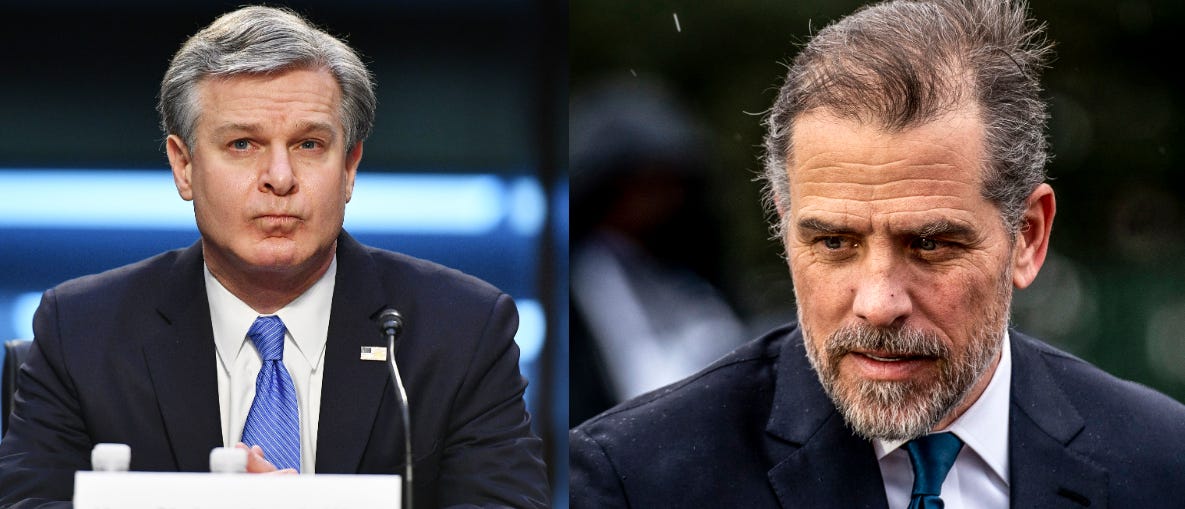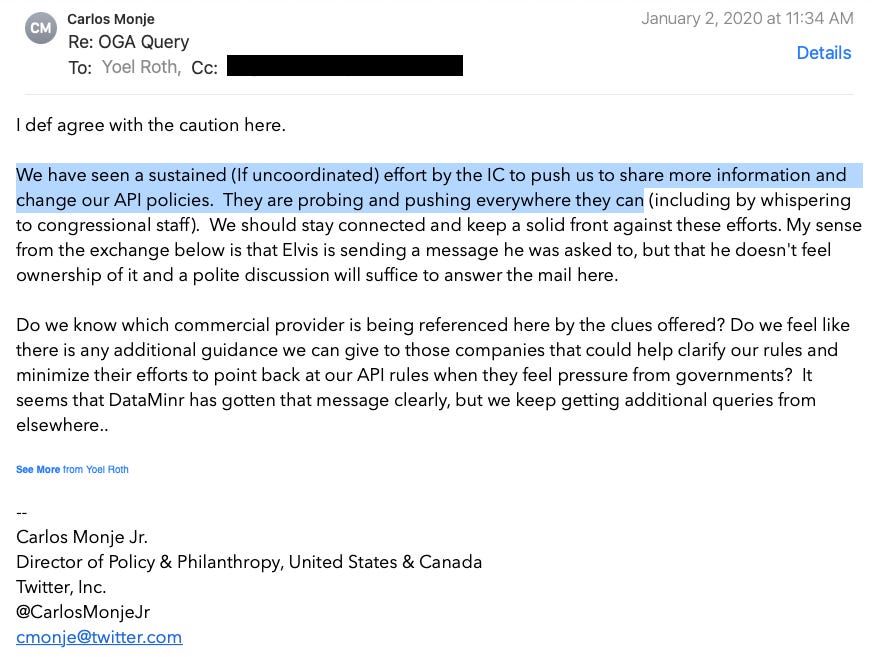More Twitter Files: Intelligence Community Pressure Campaign against Twitter
And - FBI paid millions to Twitter for its cooperation
Michael Shellenberger has just published the latest batch of what has come to be known as the Twitter Files. It’s a follow-up to Matt Taibbi’s recent Twitter Files release concerning FBI’s pressure campaign against Twitter to remove content the agency found objectionable.
Today’s release provides more details on the relationship between Twitter and the FBI, the suppression and removal of the Hunter Biden story from Twitter the FBI’s desire for Twitter to confirm a “foreign interference” narrative that didn’t exist, and how the FBI sought user location information for tweets that weren’t remotely criminal.
For a refresher, here are the highlights from the one of the most recent releases from Taibbi, who has done excellent work on this continuing story:
The FBI requested take action on what it determined to be misinformation, which included jokes from small Twitter accounts about voting dates.
FBI e-mails to Twitter asking for assessment of terms of service violations and “location information” about accounts that allegedly “spread misinformation about the upcoming election.” Some of those accounts were permanently suspended.
How the 2016 “Russian election interference” hoax influenced the FBI’s 2020 operations into reviewing American social media posts.
Today’s thread by Shellenberger expands on what we have learned.
Some findings of note:
The FBI continued its requests of location and VPN IP data from Twitter users, done without a warrant and without a subpoena: “would Twitter be open to sharing which service provider(s) those VPN IP addresses resolved to?” To its credit, Twitter pushed back on this request.
In one case, the FBI requested user data for an account that was critical of BLM and the Democrats. Twitter responded by confirming “the account in question is domestic in origin.”
The US intelligence community was pushing Twitter to “share more information” and change its user privacy settings.
Approximately 6 weeks before the 2020 election, the FBI’s Foreign Influence Task Force requested a classified briefing for Twitter general counsel James Baker (who, as you might recall, was involved in the FBI’s “botched” Russian collusion investigation). Baker, who was recently fired by Elon Musk, will come to be an important player in the Hunter Biden laptop saga, telling his Twitter colleagues the laptop materials were potentially hacked. Interestingly, on the day the Hunter Biden story was published, James Baker would have a telephone call with FBI general counsel Matthew Perry.
As to the suppression of the Hunter Biden story, recall that on October 14, 2022, the New York Post ran its explosive, and potentially election-altering, story on the Hunter’s laptop. While much of the media focuses on the more salacious parts of the laptop - Hunter’s drug use, the naked photos, the prostitutes, etc. - the real controversy was always how Joe Biden corruptly used his influence to enrich his family. That’s what the NY Post story was about: “Smoking-gun email reveals how Hunter Biden introduced Ukrainian businessman to VP dad.”
Prior to that story, according to the testimony of FBI SSA Elvis Chan, the FBI had warned social media companies, including Twitter, of a potential “hack-and-dump” operation shortly before the 2020 election cycle.
Yoel Roth, the then-Twitter Head of Trust and Safety, said he was informed by people in the intelligence community to “expect” attacks on individuals linked to political campaigns. Roth also swore there were rumors “that a hack-and-leak operation would involve Hunter Biden.” These warnings supposedly came right from the FBI. Roth’s testimony would conflict with that of SSA Chan, who said, to his knowledge, nobody provided warnings on the Hunter Biden materials.
Then we have one of the more remarkable pieces of information to be released from the Twitter: confirmation that Twitter was paid nearly $3.5 million for assisting the FBI with its processing requests.
Remarkable. Twitter was essentially contracted by the FBI, to the tune of millions of dollars, to report on users and remove non-criminal content the FBI found objectionable. One can’t help but think the money was effective in getting Twitter, and likely other social media companies, to do what the FBI wanted. After all, who can say no to a paying client with that much leverage?







De-fund the FBI.
It would be interesting to find out who provided the authorization to spend this money? There also has to be a reason provided. Can't just give to anyone for any reason.